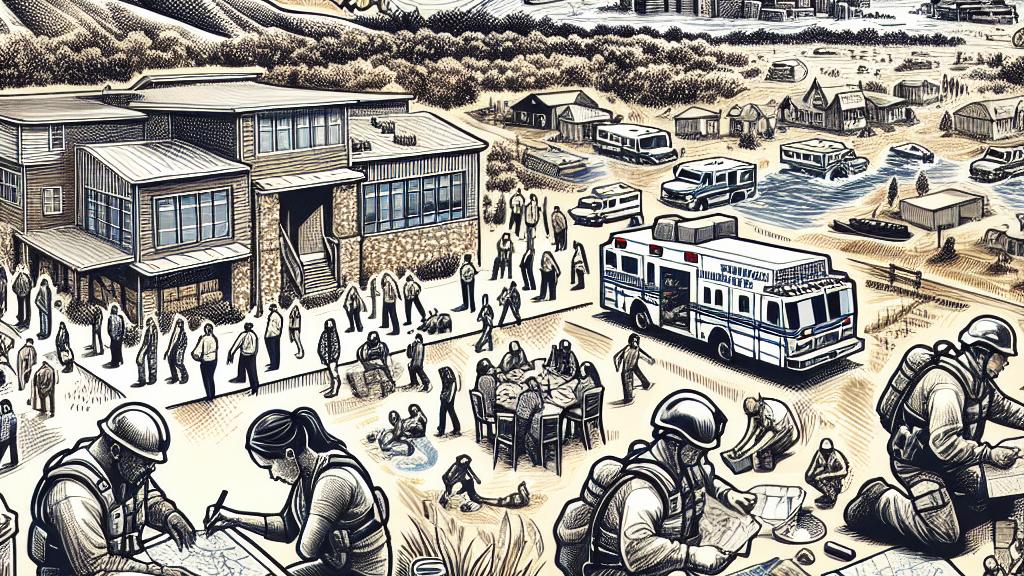The Shotgun Solution: When Disaster Strikes, Who's Really Prepared?
Overview
- Thorough examination of disaster preparedness strategies in the U.S.
- Insightful analysis of shotguns as a method of emergency defense.
- In-depth exploration of human behavior and community dynamics during crises.

Disaster Preparedness in America: A Comprehensive Overview
In recent years, disaster preparedness has become a cornerstone of public safety discourse in the United States, particularly with the increasing frequency of severe weather events and other emergencies. The Federal Emergency Management Agency (FEMA) plays a pivotal role in shaping preparedness initiatives by informing citizens about the potential hazards they face based on their geographical location. By providing resources for individuals to develop tailored emergency plans and proactive measures, FEMA fosters a proactive culture of readiness. This initiative emphasizes the importance of self-sufficiency and community involvement, ensuring that a well-prepared populace can respond swiftly and effectively when disasters strike, thereby minimizing loss and promoting resilience.
The Complex Role of Shotguns in Emergency Preparedness
The discussion around shotguns as protective mechanisms in disaster scenarios is layered and multifaceted. Traditionally, shotguns have been regarded for their utility in hunting and home defense, now increasingly viewed as a necessary accessory for personal safety in crisis situations. The suggestion that individuals might resort to firearms during emergencies reflects a prevailing sentiment of insecurity and the belief that one must protect their resources. Social media discussions often reflect a somewhat paradoxical approach, with humor interspersed in conversations about serious preparedness—joking about firearms while reinforcing a reality where self-defense becomes a priority over community cooperation. This leads to critical examination of societal values regarding protection and individual responsibility.
Psychological Insights: Trust, Dependence, and Human Behavior in Crises
Crises reveal much about the complexities of human behavior and relationships, particularly regarding trust and resource dependency. During emergencies, individuals typically exhibit a tendency to seek help from those who have prepared, potentially breeding resentment and ethical dilemmas. This behavior raises questions about fairness and the ethics of resource sharing in desperate situations. Behavioral psychology suggests that such reliance is rooted in survival instincts, resulting in some viewing preparedness as an individual responsibility rather than a collective effort. The ramifications of this dynamic can foster a culture of mistrust, wherein the social bonds necessary for community resilience are tested, ultimately resulting in a fragmented response to disasters.
Towards a Culture of Preparedness, Cooperation, and Community Solidarity
To effectively navigate the challenges posed by dependency and mistrust in times of crisis, fostering a culture of preparedness rooted in collective cooperation is essential. Communities must prioritize building relationships through collaboration, encouraging neighbors to share skills and resources. Programs that facilitate community training, emergency workshops, and shared resource hubs empower individuals while strengthening communal ties. Such initiatives promote the concept that preparedness is not solely about individual readiness but rather about collective resilience. As communities work together to support one another, reliance on defensive firearms may diminish, replaced by a strong ethos of mutual aid and shared responsibility in facing potential disasters.
Real-World Examples: Successful Community Preparedness Initiatives
Examining real-world examples illustrates the effectiveness of community-oriented preparedness initiatives. For instance, neighborhood emergency response teams (CERT) have been successful in many states. These programs train volunteers to help each other during disasters, fostering resilience and solidarity. During major hurricane events, communities that practiced coordinated emergency plans exhibited fewer instances of property loss and better overall safety outcomes. Additionally, local workshops on emergency preparedness have educated families on creating survival kits and understanding local risks, further reinforcing the community bond. These examples highlight the importance of moving beyond individual preparedness, showcasing that a united front can be significantly more effective in mitigating the impacts of disasters.

Loading...